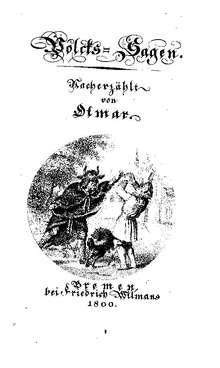Johann Karl Christoph Nachtigal
Johann Karl Christoph Nachtigal (25 February 1753 in Halberstadt – 21 June 1819 in Halberstadt) was a German Protestant theologian and philologist.
He studied philology and theology at the University of Halle, and afterwards worked as a schoolteacher at the Stephaneum in Halberstadt. In 1800 he was named school rector, and during the same time period, was appointed to the consistory. In 1802 he became ecclesiastical superintendent of the Principality of Halberstadt and the counties of Hohenstein and Mansfeld.[1]

Title page of Otmar's Volkssagen (1800)
Published works
- Zion; ältestes Drama aus der vorhomerischen Urwelt, 1796 – Zion; oldest drama from the pre-Homeric ancient world.
- Exegetisches handbuch des Alten Testaments für prediger, schullehrer und gebildete leser, 1797 – Exegetical handbook of the Old Testament for preachers, school teachers and educated readers.
- Gesänge Davids und seiner Zeitgenossen, 1796 – Songs of David and his contemporaries.
- Psalmen, gesungen, 1797 – Psalms, songs.
- Ruhestunden für Frohsinn und häusliches Glück, with Johann Gottfried Hoche (4 parts, 1798–1800).
- Das Buch der Weisheit als Gegenstück der Koheleth, 1799 – The Book of Wisdom as a counterpart of Ecclesiastes.[2]
- Volkssagen, 1800 – Folk tales; published under the pseudonym "Otmar".[3][4]
References
- ↑ ADB:Nachtigal, Johann Konrad Christoph In: Allgemeine Deutsche Biographie (ADB). Band 23, Duncker & Humblot, Leipzig 1886, S. 199 f.
- ↑ Most widely held works by Johann Karl Christoph Nachtigal WorldCat Identities
- ↑ Die Grimmelshausen-Rezeption in der fiktionalen Literatur der deutschen Romantik by Jakob Koeman
- ↑ Seite:Die Sage-Karl Wehrhan-1908 de. Wikisource
This article is issued from Wikipedia - version of the 10/27/2016. The text is available under the Creative Commons Attribution/Share Alike but additional terms may apply for the media files.